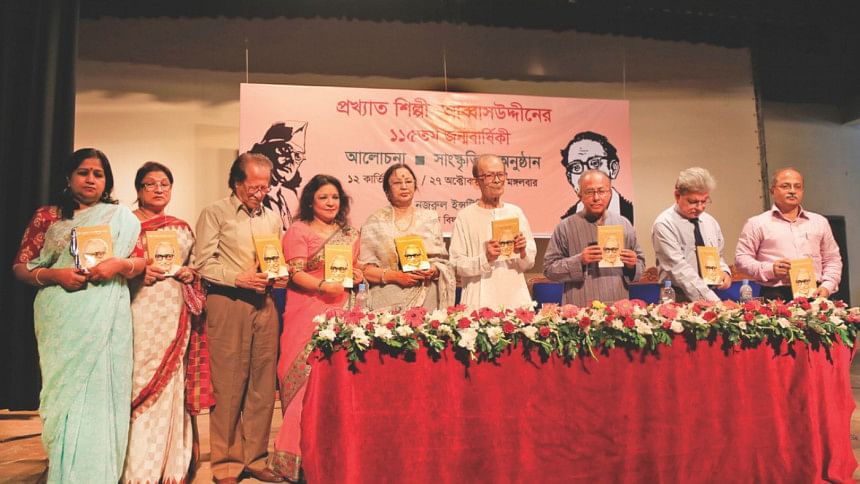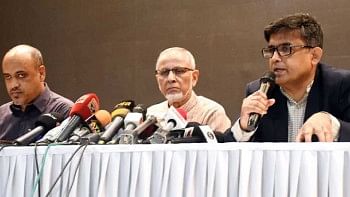Nazrul institute remembers Abbasuddin Ahmed

Nazrul institute arranged a discussion along with a musical programme to celebrate the 114th birth anniversary of legendary folk singer Abbasuddin Ahmed. The programme was held at the auditorium of Nazrul Institute, in the capital on October 27.
A discussion on “Nazrul and Abbasuddin” was held first. Eminent artist and cultural personality Mustafa Monwar attended the event as chief guest while eminent singers -- Sudhin Das, Ferdausi Rahman and Dr. Nashid Kamal -- with former cultural secretary Dr. Ranjit Biswas were honourable guests. Executive Director of Nazrul Institute Ikram Ahmed delivered the welcome address while Professor Emeritus Rafiqul Islam, also the Chairman of Nazrul Institute Trustee Board, presided over the discussion.
Mustafa Monwar shared memories of Poet Kazi Nazrul Islam and Abbasuddin. “The rendition of folk songs by Abbasuddin Ahmed evokes the visuals of idyllic Bengal. I can even envisage the colours and flavour of eternal Bengal in his rendition of Bhawaiya songs,” said Mustafa Monwar.
“Abbasuddin Ahmed was a person of delicate taste. He was a complete man. Artistes have many things to learn from his unique rendition and lifestyle. The foremost contribution of the legend is to initiate music in Bangalee Muslim society that was earlier considered profane and was prohibited. We must be grateful to Kazi Nazrul Islam, Abbasuddin Ahmed, Polli Kobi Jasimuddin, Poet Golam Mostafa and others who initiated cultural practice in Muslim society,” said Rafiqul Islam.
The programme also included launching of Sohrab Hossain Memorial Book, published by Nazrul Institute. The guests, along with two daughters of Sohrab Hossain -- Rowshan Ara Shoma and Rahat Ara Geeti -- unveiled the book.
A musical programme followed, where young artistes of Nazrul Institute and of Abbasuddin Academy rendered choral songs. Dr. Nashid Kamal, Kiran Chandra Roy and Chandana Majumdar were among others to render solos at the event.
Abbasuddin was born on October 27, 1901 in Cooch Behar, India. Abbasuddin was self-taught, except for a brief period when he learnt music from Ustad Zamiruddin Khan in Kolkata and Ustad Kader Buksh in Murshidabad. He sang different types of songs, though he became renowned mainly as a folk singer – singing Bhawaiya, Khirol and Chatka songs from Rangpur and Cooch Behar. He became increasingly popular with his rendition of Jari, Shari, Bhatiali, Murshidi and Bichchhedi -- especially when these were made into gramophone records. He also sang songs on Islamic themes composed by Kazi Nazrul Islam, Jasimuddin and Golam Mostafa.

 For all latest news, follow The Daily Star's Google News channel.
For all latest news, follow The Daily Star's Google News channel. 



Comments